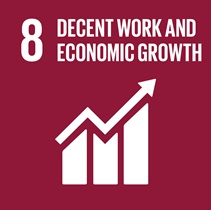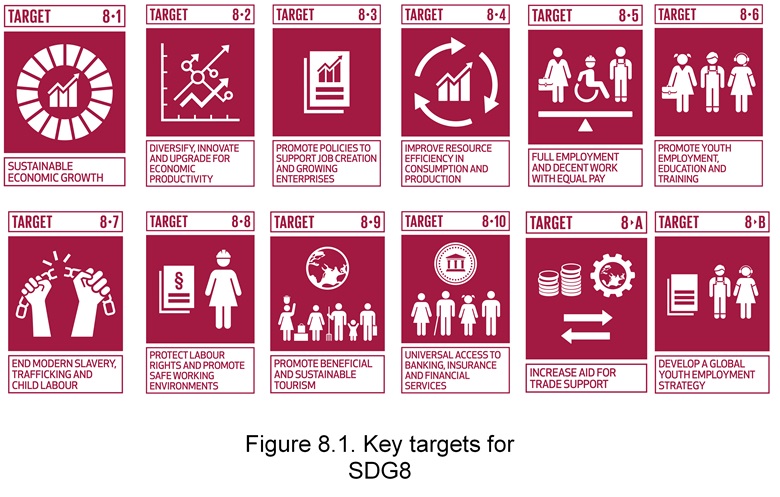Sustainable Development Goals (SDGs) – What Engineers can do to advance SDG8
By : Eng. Saja A.A. Majeed The SDGs provide an integrated framework of social, economic and environmental commitments to advance the development in a rapidly changing and complex world. Economic growth is one of the three key pillars of an integrated approach to sustainable development, among other pillars - social equity and environmental sustainability. Hence, it is important to enhance the culture and environment of decent work to overcome ever increasing challenges and gain a path to economic prosperity.
The SDGs provide an integrated framework of social, economic and environmental commitments to advance the development in a rapidly changing and complex world. Economic growth is one of the three key pillars of an integrated approach to sustainable development, among other pillars - social equity and environmental sustainability. Hence, it is important to enhance the culture and environment of decent work to overcome ever increasing challenges and gain a path to economic prosperity.
The global landscape continues to evolve towards rapid automation and digitisation, which will have an impact on the labour market. How do we position ourselves to this change and what policy direction will this drive the engineering organisations and industries are the urgent questions to explore answers. It’s time for us to think innovatively to transform our education system, thus the workforce is aligned towards industrial and social requirements. It gets our younger generation into an entrepreneurial mindset to become part of the manufacturing and makers’ community, developing products for automation and digital transformation, not merely as passive recipients and consumers of final products.
The degree of good practices in engineering organisations in terms of the pay and treatment to engineering professionals is another factor of concern which has an impact in creating a decent work culture across the profession. Provision of an adequate enabling environment and support structure without discriminating them based on gender and other socio-cultural factors are essential to promote an effective and productive work culture.
In this context, how can Engineers contribute to attain Sustainable Development Goal (SDG) 8 – “Decent Work and Economic Growth”, which is to promote sustained, inclusive and sustainable economic growth, full and productive employment and decent work for all. Engineers are a key part of the economic growth of the country. In relation to SDG8, Engineers need to explore what kind of contributions are expected from them and what the engineering community has to offer to enable a faster economic growth, particularly in the global and regional context of post-COVID19 pandemic trends.
Global key figures related to ‘Decent Work and Economic Growth’ (SDG8)
Some of the relevant global key figures related to Decent Work and Economic Growth provided in the United Nation statistics include (https://sdgs.un.org/goals/goal8):
- the global unemployment rate stood at 5% in 2019, which is expected to reach historic highest in post 2020 due to global pandemic
- During the COVID19 pandemic, 1.6 billion workers in the informal economy risk loosing their livelihoods as 61% of workers globally were engaged in informal employment according to 2016
- Tourism is facing an unprecedented challenges due to limited global mobility during COVID19
SDG 8 (Decent Work and Economic Growth) targets
SDG 8 sets out ten key targets and two additional targets (8.a and 8.b) for resource mobilisation and policy to be achieved by 2030. The twelve key targets are:
- 8.1 Sustain per capita economic growth in accordance with national circumstances and, in particular, at least 7 per cent gross domestic product growth per annum in the least developed countries
- 8.2 Achieve higher levels of economic productivity through diversification, technological upgrading and innovation, including through a focus on high-value added and labour-intensive sectors
- 8.3 Promote development-oriented policies that support productive activities, decent job creation, entrepreneurship, creativity and innovation, and encourage the formalization and growth of micro-, small- and medium-sized enterprises, including through access to financial services
- 8.4 Improve progressively, through 2030, global resource efficiency in consumption and production and endeavour to decouple economic growth from environmental degradation, in accordance with the 10-year framework of programmes on sustainable consumption and production, with developed countries taking the lead.
- 8.5 By 2030, achieve full and productive employment and decent work for all women and men, including for young people and persons with disabilities, and equal pay for work of equal value
- 8.6 By 2020, substantially reduce the proportion of youth not in employment, education or training

- 8.8 Protect labour rights and promote safe and secure working environments for all workers, including migrant workers, in particular women migrants, and those in precarious employment
- 8.9 By 2030, devise and implement policies to promote sustainable tourism that creates jobs and promotes local culture and products
- 8.10 Strengthen the capacity of domestic financial institutions to encourage and expand access to banking, insurance and financial services for all
- 8.a Increase Aid for Trade support for developing countries, in particular least developed countries, including through the Enhanced Integrated Framework for Trade-Related Technical Assistance to Least Developed Countries
- 8.b By 2020, develop and operationalize a global strategy for youth employment and implement the Global Jobs Pact of the International Labour Organization
SDG 8 (Decent work and economic growth) target indicators (examples)
The achievement of decent work and economic growth is measured by the following set of key indicators:
- Annual growth rate of real GDP per capita and per employed person
- Proportion of informal employment in non‑agriculture employment
- Material footprint, material footprint per capita, and material footprint per GDP and similar indicators for domestic material consumption
- Average hourly earnings of female and male employees
- Unemployment rate, proportion of youth not in education, employment or training, and proportion and number of children engaged in child labour
- Frequency rates of fatal and non-fatal occupational injuries
- Increase in national compliance of labour rights
- Tourism direct GDP as a proportion of total GDP and in growth rate and number of jobs in tourism industries as a proportion of total jobs and growth rate of jobs
- Number of commercial bank branches and automated teller machines (ATMs) per 100,000 adults and proportion of adults with an account at a bank or other financial institution or with a mobile-money-service provider
Detail indicator descriptions are available at https://unstats.un.org/sdgs website.
Current status of SDG 8 progression in Sri Lanka
The current status of achieving SDG 8 in Sri Lanka was reported in the recent review by the Government of Sri Lanka (SLVNR 2018). Some of the key contributions include:
- The contribution of informal sector employment to total employment is about 60%, of which around 60% is in the non-agricultural sector
- The migrant population of Sri Lanka is 1.8 million and their remittances account for the major share of Sri Lanka’s annual GDP
- With the steady growth of tourism in post-war Sri Lanka, the earnings as a share of GDP increased from 1.8% to 5.6% between the 2009-2016 time period (In 2016, the tourism industry provided 146,115 direct and 189,544 indirect jobs). Severe impact due to COVID19 pandemic in the tourism sector has been felt across the nation, particularly people who relied directly or indirectly on tourism sector jobs, hence innovative resilient strategies need to be built-in within the tourism sector to encounter future shocks.
- Addressing the shortage of skilled jobs requires sustained economic growth and corresponding job creation, particularly in the manufacturing and services sectors.
Link between engineering and economic growth (the contribution from the engineering sector to achieve SDG 8)
Engineers play a key role in designing and planning projects and transforming them into reality. Young engineers need to be provided with the right set of skills to become emerging leaders in innovation and entrepreneurship, and also the system should enable them to fit into diverse job markets. Further, there is an important link between a country’s engineering/innovation capacity and its economic growth. For example,
EBR (2015) highlighted the direct and microeconomic impacts of engineering in the economic growth of the United Kingdom. The engineering sectors contributed to an estimated £455.6 billion to Gross Domestic Product (GDP) in 2014, 27% total GDP of the UK. Further, total employment in engineering sectors is estimated at 5.6 million in 2014, representing 18% of total employment in the UK. The Tax contributions of engineering sectors in the UK amounted to £118 billion for tax year 2013/14. Similarly, for every one full time equivalent (FTE) employed in engineering sectors in the UK, employment of a further 1.74 FTEs is supported in the wider UK economy through indirect and induced multiplier impacts.
WEFO (2018) highlighted that it is essential to have sufficient engineering human capital for national development, who can design, build and maintain vital infrastructure to international standards that help to deliver maximum benefit to the nation’s economy. There is an increasing need for quality and talented engineers to manage the rapidly evolving technological innovation, physical and social infrastructure development and urbanisation.
Next SDG: SDG 9 – Industry, Innovation & Infrastructure
In the next issue of digital SLEN, we will continue with the snapshot of SDG 9: “Industry, Innovation & Infrastructure‘’. All SDGs are well connected, and thus require a holistic view to address real development challenges. Until then, let us reflect on SDG 8 – ‘Decent Work and Economic Growth’ and its central role in the Engineering sector and profession. Your comments on how we as Engineers can contribute to achieve SDGs can be posted in the following IESL Facebook page https://www.facebook.com/IESLSriLanka/.
References
- https://unstats.un.org/sdgs/indicators/Global%20Indicator%20Framework%20after%202019%20refinement_Eng.pdf
- https://www.wfeo.org/wp-content/uploads/stc-young_engineers/WYEC-BROCHURE_FINAL_VERSION.pdf
- Royal Academy of Engineering, 2016. Achieving the United Nations Sustainable Development Goals, Engineering a better world, https://www.raeng.org.uk/publications/other/engineering-a-better-world-brochure
- Sri Lanka Voluntary National Review (SLVNR) on the Status of Implementing Sustainable Development Goals, 2018. Ministry of Sustainable Development, Wildlife and Regional Development, Published by the Ministry of Sustainable Development, Wildlife and Regional Development in June, 2018.
- WFEO 2018. Engineering 2030 A Plan to advance the achievement of the UN Sustainable Development Goals through engineering , Progress Report No. 1 - October 2018 A collaborative project with Sustainable Development Goals Division of Science Policy and Capacity Building Natural Sciences Sector, http://www.wfeo.org/wp-content/uploads/un/WFEO-ENgg-Plan_final.pdf#page=16
- WFEO (2018) The Paris Declaration: Advancing the UN Sustainable Development Goals through engineering, 7 March 2018, WFEO and UNESCO Declaration, available in Annex 1 at the https://sustainabledevelopment.un.org/content/documents/241538_World_Federation_of_Engineering_Report.pdf (Accessed on 11 November 2020).
- Engineers Without Borders, https://www.ewb.ca/en/hello2030/affordable-and-clean-energy/ and https://www.ewb.org.au/solarenergyproject/ ,
- CEBR (2015) The contribution of engineering to the UK economy – the multiplier impacts A report for Engineering, UK, January 2015 https://www.engineeringuk.com/media/1323/jan-2015-cebr-the-contribution-of-engineering-to-the-uk-economy-the-multiplier-impacts.pdf
 Eng. Saja A.A. Majeed
Eng. Saja A.A. Majeed
Lecturer
Faculty of Engineering, South Eastern University of Sri Lanka.





